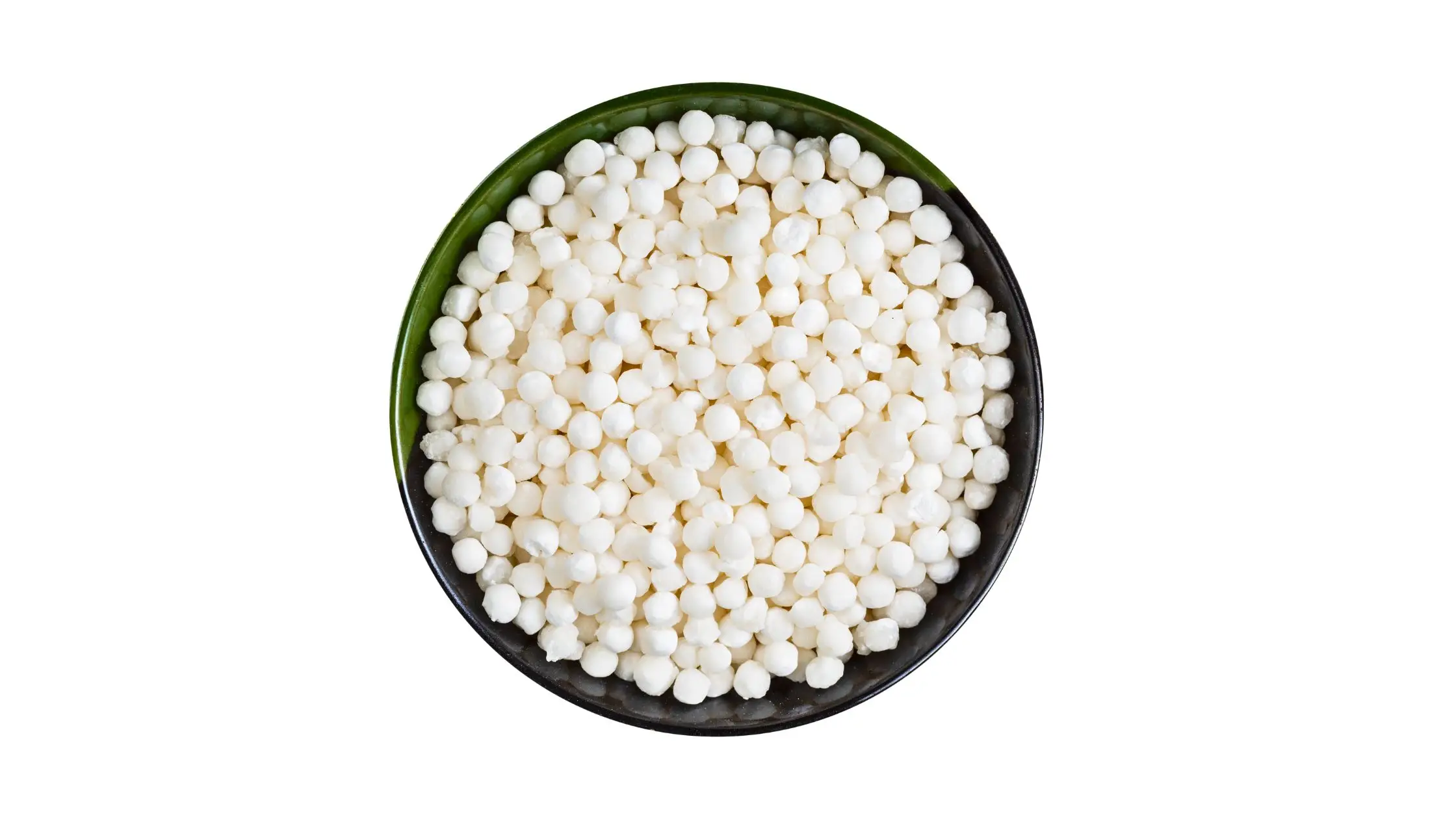
15 Amazing Benefits of Sabudana and its Side Effects
- Published on:
- Last update: 15 April 2025

Sabudana, also known as tapioca pearls, is a popular ingredient in Indian households, especially during fasting seasons like Navratri. But there’s more to sabudana than just being a vrat-friendly food. Packed with energy, easy to digest, and surprisingly versatile, sabudana offers a range of health benefits that make it worth including in your diet regularly. In this blog, we’ll explore the 15 health benefits of sabudana, how it supports your health, and why it deserves a spot on your plate beyond just festive occasions.
Table of Contents
ToggleWhat is Sabudana?
Sabudana, also known as tapioca pearls, is made from the starch of the cassava root, a tuber native to South America that eventually made its way into Indian cuisine through colonial trade routes. The starch is processed into small, round balls that swell up beautifully when soaked. While it is predominantly used in Indian cuisine, sabudana is, in fact, a global citizen, appearing in everything from bubble tea in Asia to puddings in South America. Its neutral taste makes it a blank canvas, absorbing the flavours of whatever spices or ingredients it’s paired with.
Nutritional Value of Sabudana (Per 1 Cup Cooked)
| Nutrient | Amount (per 1 cup) |
|---|---|
| Water | 14 g |
| Calories | 544 |
| Carbohydrates | 135 g |
| Fiber | 1.37 g |
| Protein | 0.29 g |
| Fat | 0.03 g |
| Calcium | 30.4 mg |
| Iron | 2.4 mg |
| Magnesium | 1.52 mg |
| Potassium | 16.7 mg |
| Sodium | 2 mg |
| Thiamin | 1 mg |
| Vitamin B5 | 2 mg |
| Vitamin B6 | 1 mg |
| Folate | 1 mg |
| Choline | 1.2 mg |
15 Health Benefits of Sabudana
Sabudana is packed with various health benefits that extend far beyond just being a fasting food. Here are 15 health benefits of sabudana and why it deserves a place in your diet:
1. Prevents birth defects
Sabudana is an excellent source of folate (vitamin B9), an essential nutrient during pregnancy. Folate plays a crucial role in early fetal development, particularly in the formation of the neural tube, reducing the risk of birth defects like spina bifida and anencephaly. Including folate-rich foods like sabudana ensures the health of both mother and baby, contributing to a smooth pregnancy and the development of a healthy baby.
2. Supports digestion
Sabudana is gentle on the digestive system, making it ideal for those recovering from digestive issues. Its mild, easy-to-digest starch content helps soothe the digestive tract and relieve discomfort. It also aids in relieving constipation by offering a binding effect that helps regulate bowel movements, making it a great option for those with sensitive stomachs or gastrointestinal concerns.
3. Gluten-Free and Celiac-Safe
For those with celiac disease or gluten intolerance, sabudana offers a naturally gluten-free alternative to grains like wheat and barley. It’s safe to consume without causing any digestive discomfort or immune reactions, making it a valuable option in gluten-free diets. Its versatility means it can be used to prepare a wide range of gluten-free meals, from savoury dishes to sweet treats.
4. Provides a quick energy boost
Packed with easily digestible carbohydrates, sabudana is a great source of quick, lasting energy. Often used during fasting to maintain energy levels, it also serves as the perfect snack for anyone needing a rapid energy lift. The carbohydrates in sabudana are quickly absorbed by the body, offering an instant energy boost without the dreaded crash that often follows sugary snacks or caffeinated beverages.
5. Improves skin and hair health
Sabudana is often recommended for skin and hair health due to its zinc and antioxidant content. Zinc plays a vital role in maintaining healthy skin and scalp, helping reduce acne, dandruff, and dark spots. By nourishing the skin from within, sabudana can promote a clearer complexion and overall skin health. It also supports hair health, making it a great food for a radiant, healthy appearance.
6. Regulates blood sugar levels
While sabudana is high in carbohydrates, it has a moderate glycemic index, meaning it doesn’t cause rapid spikes in blood sugar when consumed in moderation. Those managing their blood sugar levels should take sabudana with fibre or protein to slow down sugar absorption. It helps maintain steady energy levels throughout the day without overwhelming the system with excess sugar.
7. Improves nervous system health
Sabudana contains essential B vitamins, like B6 and thiamine, necessary for maintaining a healthy nervous system. These vitamins aid in the production of neurotransmitters that support mood, memory, and cognitive function. Including sabudana in your diet can improve brain function, reduce stress levels, and contribute to mental well-being, preventing nerve-related issues over the long term.
8. Provides essential amino acids for muscle repair
Although not a complete protein, sabudana contains important amino acids like methionine and lysine. These amino acids are essential for tissue repair, enzyme production, and immune function. When combined with other protein-rich foods, it can help meet your body’s daily protein needs. It’s particularly beneficial after exercise, as the amino acids aid in muscle recovery and physical restoration.
9. Relieves stress
Magnesium in sabudana helps relax the nervous system and reduce stress. Magnesium has calming properties that can improve sleep quality, reduce the physical symptoms of stress, and support mental well-being. Consuming sabudana, especially after a stressful day, can help unwind the body and calm the mind, making it an ideal food for managing anxiety and stress levels naturally.
10. Supports bone health
Sabudana is rich in calcium, magnesium, and iron, minerals essential for bone health. These minerals help build bone density, reduce the risk of conditions like osteoporosis, and ensure strong bones throughout life. The regular consumption of sabudana helps prevent mineral deficiencies and supports overall bone strength, making it an excellent choice for maintaining healthy bones.
11. Regulates blood pressure naturally
Potassium, found in sabudana, plays a key role in regulating blood pressure. It balances sodium’s effects in the body, relaxes blood vessels, and promotes smoother blood circulation. Regular consumption of sabudana can contribute to lower blood pressure, supporting heart health and overall vascular function.
12. Helps manage diarrhoea and loose motions
Sabudana’s binding properties make it an effective remedy for diarrhoea or gastrointestinal upset. Its easily digestible starch helps firm up stools, while its mild nature soothes the digestive system. Sabudana provides the necessary calories during recovery, helping to maintain energy levels without overwhelming the system. It’s a natural solution to managing loose motions and aiding in gastrointestinal recovery.
13. Aids in muscle recovery
Sabudana is an excellent source of carbohydrates and amino acids, both essential for muscle recovery after physical activity. Carbohydrates replenish glycogen stores while amino acids support muscle repair. Combined with protein-rich foods, sabudana becomes an ideal post-workout meal, providing your body with the nutrients needed for muscle tissue recovery.
14. Supports healthy weight gain
For those looking to gain weight healthily, sabudana is a great choice. It’s calorie-dense, offering concentrated energy in a small volume. Sabudana can be prepared with milk, ghee, or coconut milk to create nourishing, calorie-dense meals that help promote healthy weight gain. Its easy digestibility and nutrient content make it a filling option for individuals needing to increase their calorie intake.
15. Sabudana for weight loss
Surprisingly, sabudana can also support weight loss when consumed in moderation and as part of a balanced diet. While it’s calorie-dense, it’s also rich in complex carbohydrates that provide sustained energy, helping curb overeating by keeping you fuller for longer. The trick is to prepare it with low-calorie ingredients such as vegetables, herbs, and spices while avoiding excessive ghee or sugar. When paired correctly, sabudana can be a great option for those looking to shed a few pounds while staying nourished.
Benefits of Sabudana for Women
Sabudana offers numerous benefits for women, particularly with hormonal balance and energy. Rich in folate and iron, it supports women’s overall health, especially during menstruation and pregnancy. Its ability to improve digestion and promote healthy skin can address issues like acne or bloating. Sabudana’s mild, easily digestible nature is a great option for women with sensitive stomachs or those recovering from illness.
Benefits of Sabudana for Men
Sabudana offers unique benefits for men, particularly in boosting fertility and supporting prostate health. Rich in essential vitamins and minerals, it helps maintain healthy testosterone levels, vital for reproductive health and overall vitality. It also supports a healthy immune system and reduces oxidative stress, potentially protecting against prostate inflammation.
How to Use Sabudana
Sabudana is incredibly versatile and can be incorporated into your diet in various ways. Here are some suggestions:
- Soaking: Soak sabudana in water for 2–3 hours or overnight to soften the pearls before cooking.
- Sabudana Khichdi: Sauté soaked sabudana with mustard seeds, cumin, curry leaves, and vegetables like potatoes and peas for a savoury breakfast or light meal.
- Sabudana Vada: Mix soaked sabudana with mashed potatoes, crushed peanuts, and spices, shape into patties, and fry until crispy.
- Sabudana Pudding: Cook soaked sabudana in milk, adding sugar and cardamom for a creamy, sweet dessert.
- Sabudana Salad: Combine soaked sabudana with chopped veggies, lemon juice, and spices for a refreshing, light salad.
- Sabudana Drink: Add soaked sabudana to drinks like sabudana sherbet or lemonade for added texture and energy.
Remember: Sabudana should always be cooked or soaked thoroughly, as it can be difficult to digest if undercooked.
Side Effects of Sabudana
While sabudana is generally safe when consumed in moderation, overconsumption can lead to some undesirable side effects. Due to its high carbohydrate and calorie content, excessive intake may cause weight gain or spikes in blood sugar levels, particularly for people with diabetes. Additionally, improper soaking or cooking may result in digestive discomfort. Always ensure sabudana is cooked properly and consumed in suitable amounts for optimal health benefits.
FAQs on Sabudana Benefits
Can we eat sabudana daily?
Yes, sabudana can be eaten daily in moderation as part of a balanced diet, but overconsumption may lead to digestive issues.
Are there any side effects of sabudana?
Excessive consumption of sabudana can cause blood sugar spikes and digestive discomfort, especially if not soaked properly.
Is sabudana healthier than rice?
Sabudana is higher in carbohydrates but lower in protein compared to rice, making it a good energy source but not necessarily “healthier” than rice.
Share this post:

